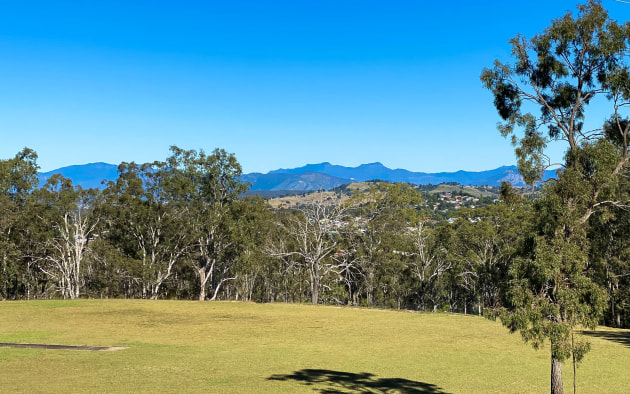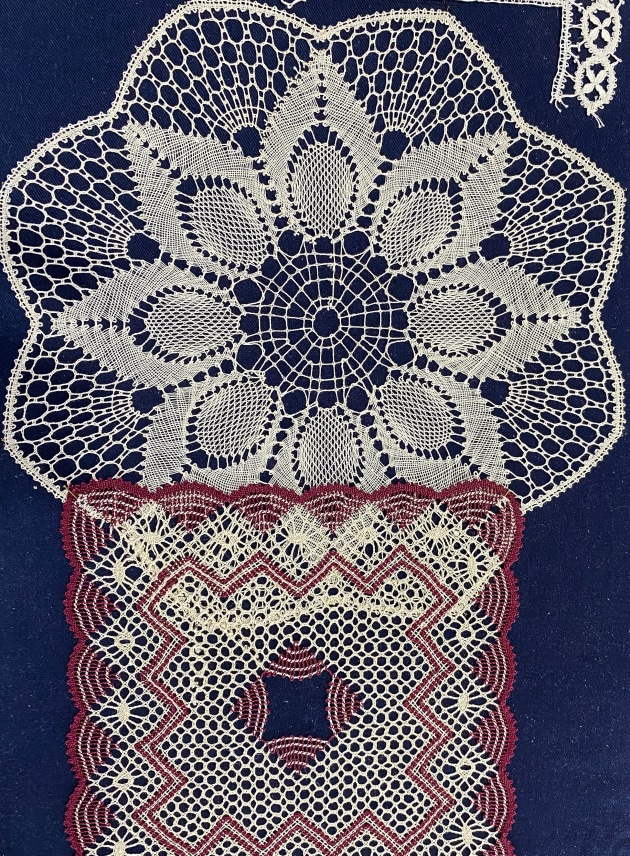Q-Turn: a hands-on event for all woodworkers
Words and photos: Terry Martin
Standing on a hill above the small town of Boonah, I looked north towards Ipswich, about 45 minutes away. Gum trees encircled the hill and in the distance the mountains were a deep blue cutout against the perfect sky.
It was June 2023 and South-East Queensland was at its winter best, but it was far from quiet. When I turned around I faced an enormous open-sided shed filled with people laughing, talking, and busily working at lathes and other machines. This was Q-Turn 2023, the annual get-together of woodturners that has been running since 2001, so I went inside to talk to the 70 or so busy people.

There were many lathes, some with one person working quietly, and others with several people gathered around. At one end of the shed there was a group of scroll sawyers and others doing pyrography. The air was filled with the scent of freshly cut wood and the acrid scent of burnt wood. The overwhelming impression was of intense focus on work against a background of friendly chatter.

I knew that each turner brings their own lathe and equipment, so I decided to walk among them to see what they were making. One man was turning lace bobbins, which is closely focused work, so I stepped in to watch him for while.
He introduced himself as John Lowther. I was impressed by his speed and efficiency, so I asked him what got him into turning bobbins. His answer surprised me: “I need bobbins because I’m a lace maker”. I have met a number of men who turn lace bobbins, but this was a first. John explained: “Before I retired I was looking for a craft and I wanted to do something very different. I got interested in bobbin lace, but there was nowhere to buy the bobbins, so I decided to make my own.”
That was 25 years ago and John is in his early 80s now. He pointed to his work on a table behind him and my eye was immediately drawn to the samples of John’s lace work (see above). I know little about lace, but I could see that these delicate pieces were very complicated. Beside them was an amazing array of different bobbins, all neatly boxed and labelled.
There were both large and tiny ones, some patterned, some with colourful inlays, and some with tiny bobbins-within-bobbins, all in perfectly matched sets. I knew I was looking at the work of a highly accomplished craftsman.

At the non-turning end of the shed I found Bub Benstead sitting with serene concentration, working on a pyrographic image. With a friendly smile she talked to me about her work: “I’ve been doing pyrography for around 20 years. I usually give my pieces away and this one is for a friend of mine who recently lost her husband. She owns their transport company, so I’m doing a truck for her.”
Bub’s husband Howard was nearby working on a scroll-sawn box (see below) so I asked her if they help each other with their work. “No”, she strongly replied, “I get all the wood and sand it all myself. We used to have a farm and a lot of the timber came from there. If a tree died or was struck by lightning, we used to cut it down and take it to the local sawmill and get it milled into planks.” Bub’s can-do attitude impressed me very much.

Alan Nielsen is a member of Ipswich Woodcrafts Club, the same club I belong to. I found him working intently at his scroll saw and asked him to tell me his story. “I had a career in the air force”, he said, “but after I retired I took up woodwork. This is my third time here and I absolutely love it. Even though it’s called Q-Turn, it’s open to pretty much any kind of woodworking. The best thing is watching how other people do things and talking to like-minded people, even if they’re doing different things to what you do. A turner might want to do something different on a bowl and a pyrographer might show them a new detail they can do on the rim. My wife is getting into carving, so now I’m cutting out a blank for her.”
I found Marilyn Kunde busy at her lathe. Marilyn comes from the Redcliffe Woodcrafts Society and she told me how much she loves Q-Turn: “Over the last 20 years I’ve been about 15 times. This time I’ve been going around talking to so many people and I’ve learnt so much. People say, ‘Come and have a go!,’ and the skill levels are amazing. Here they share more than any other group I know.” Marilyn was 25 years in the army and was a truck driver for six of those, so she is very comfortable with machinery. She explained how she became a woodworker: “While I was in the army I did a TAFE course on French polishing, and that first became a hobby, then it grew into a full-time business. Both of my grandfathers were timber-getters, and my father and all my uncles worked in the timber industry. Now I operate the sawmill at my club because I know how to get the best out of the wood.”

The largest group in the shed was gathered around a lathe with Jim Tutin. Jim is Vice President of the Ipswich Woodcrafters Club, and since 2007 he has been the main organiser of Q-Turn, so it is considered to be a club event. Jim explained why he spends almost all of his time at Q-Turn teaching aspiring turners: “I’ve been a member of Ipswich Woodcrafters since it was founded in 1988. I never thought I’d be a teacher, but over time it developed from showing somebody something simple till now when I do most of the teaching at the club and here as well.”
In the early years Q-Turn had been held at several venues, but now it seems very settled in Boonah. “It’s an enormous shed,” Jim explains, “the quarters are air-conditioned, it can accommodate up to 75 people, and we pay a caterer to prepare the meals. This year (2023) it cost $260 for the three days, including food and accommodation, as well as all the infrastructure set up by all the attendees. There have been 22 Q-Turns, and I believe that makes it the longest still-running event of its kind in Australia. People come from as far away as Victoria.
“They tend to work year-round in their own sheds, concentrating on what they like to do, and they often don’t have contact with anyone else. They might go to their local club, but they often don’t see different work, or challenge themselves to try different things. At Q-Turn you have three full days and nights where you can work as much as you like and as articles are finished they are placed on a large table. If you like something you can ask the maker about it and they’ll probably show you.
“At my first Q-Turn I saw one man turning wooden hats and another man making coffin handles for an undertaker. Over half an hour I chatted with each of them, learnt a lot that I never knew before, and made some new friends. It’s not like a symposium where all you do is sit and watch somebody else work, and with an extremely limited view. At Q-Turn everyone can learn hands-on.” When I commented that there were a lot of very impressive women at the event, Jim proudly explained: “Years ago it was rare to see a woman at events like this, but over recent years a lot more are coming and now they don’t feel so isolated.”
The original meaning of “amateur” was “one who loves” and there was no doubt that everyone I saw loved what they were doing. Being an amateur can be more conducive to doing good work than if you have to earn enough to pay the bills. They have more time to devote to perfecting skills at their own pace and, equally important, many amateurs come from diverse backgrounds and that means they can bring different skills to the task.
I have no idea how many amateur woodworkers there are in Australia, but in the many woodworking clubs across the country skills are shared, and traditional skills are maintained and handed on. Q-Turn is an outstanding example of a club event where such things happen and I am sure I will go again next year.
In 2024, Q-Turn takes place from 7–9 June. For more information contact Ipswich Woodcrafts Club via their website at ipswichwoodcraftsclub.org
Terry Martin is a wood artist and author who lives in Ipswich, Qld, see terrymartinwoodartist.com





